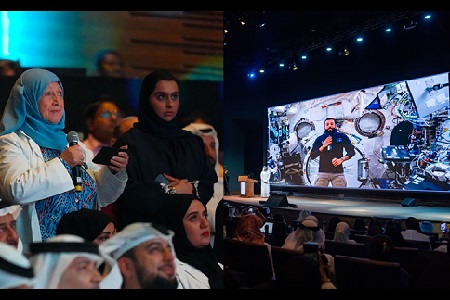 Emirati astronaut Sultan Al Neyadi hosted ‘A Call from Space’ – Medical Science edition from the International Space Station (ISS) in Dubai. The event, held in partnership with the Mohammed Bin Rashid University of Medicine and Health Sciences (MBRU), attracted close to 400 attendees, including medical professionals and students from universities in the UAE.
Emirati astronaut Sultan Al Neyadi hosted ‘A Call from Space’ – Medical Science edition from the International Space Station (ISS) in Dubai. The event, held in partnership with the Mohammed Bin Rashid University of Medicine and Health Sciences (MBRU), attracted close to 400 attendees, including medical professionals and students from universities in the UAE.
The event was attended by Salem Humaid AlMarri, Director General of MBRSC, Dr Hussain Abdul Rahman Al Rand, Assistant Undersecretary for the Public Health Sector, Ministry of Health & Prevention, Dr Amer Sharif, CEO of the Dubai Academic Health Corporation and President of MBRU, and Professor Alawi Alsheikh-Ali, Chief Academic Officer of the Dubai Academic Health Corporation and Provost of MBRU, in addition to other leadership team members.
Addressing the attendees before the live call, Salem Humaid AlMarri, Director General of MBRSC, said: “Over the past few months, through the longest Arab space mission in history, Al Neyadi has provided us invaluable scientific data. Each one of the experiments he is part of is fuelling our drive towards unprecedented advancements in science. These research initiatives reflect our commitment to integrating space exploration with diverse scientific disciplines. Thus, ensuring that our space programme contributes not just to the field of space science but to multiple sectors.”
The fifth instalment of the live call series with Al Neyadi was focused exclusively on the medical science field. During the event, Adnan AlRais, Mission Manager, UAE Astronaut Programme, gave an overview of the programme and briefed the attendees on updates about the mission. “This mission is a platform for international collaboration, as well as to advance our science and technology. We are working very close with the international space community, to share our knowledge and experience and are also giving access to our scientists, researchers and students to this unique environment to conduct experiments,” added AlRais.
Dr Hanan Al Suwaidi, who is the flight surgeon for Al Neyadi, shared information and insights into space medicine, physiological deconditioning in space and medical operations related to flight, among others. Talking about the current mission, Al Suwaidi stated: “The impact of this mission has been great, with the youth of our country having real-life examples of space science that they can utilise going forward. It is a living legacy, touching all of humanity with real genuine curiosity that has brought us to where we are and we need to continue taking it forward.”
Al Suwaidi was selected to look after Al Neyadi’s health before and after his journey to space, as well as while he is currently on board the ISS. She was also the flight surgeon for Hazzaa AlMansoori during his mission to the ISS back in 2019.
During the live call, Al Neyadi answered queries put forth by the attendees, including about the benefits gained from his exercise routine, special medical training undergone by astronauts, physiological changes experienced by him and key lessons gained from space to better healthcare on Earth, among others. He also shared insights into the ongoing medical experiments and research on the ISS.
Concluding his interaction, Al Neyadi commented: “We are here for the sake of science and advancing technologies and healthcare for humanity. It is a great deal for the medical community in the UAE and the world. We are going to keep this going and hope we will have more missions in space, where we can help humanity and represent the UAE within the scientific community and beyond.”
Over the course of three months, Al Neyadi has conducted several ground-breaking experiments and routine tasks, all contributing significantly to the field of medical science and the understanding of human health in space.
One of Al Neyadi’s most intriguing experiments included treating samples for the Engineered Heart Tissues-2 experiment in the Kibo laboratory module using Kibo’s Life Sciences Glovebox. This research could potentially help doctors treat space-caused heart conditions and terrestrial cardiac disorders. He has also been actively engaged in monitoring his cardiovascular system through a wearable Bio-Monitor smart shirt and headband, providing critical data amidst his routine activities. This ongoing mission is a significant step towards understanding the cardiovascular implications of extended space travel.
Other noteworthy medical experiments carried out by Al Neyadi involve the Monoclonal Antibodies Protein Crystal Growth-2 (PCG2) experiment. This study aims to understand the process of crystallising biotherapeutics in microgravity, potentially improving production techniques both in-space and on Earth, and accelerating the development of new medicines. In addition, Al Neyadi has participated in a host of human research activities that dominated the ISS crew’s schedule. These studies included ultrasound scans, vision checks, and hearing exams, using standard medical imaging gear found in an optometrist’s office on Earth.
‘A Call from Space’ event series will now move to other emirates in the UAE, as it continues to inspire and educate audiences about Al Neyadi’s mission, life on the ISS and space in general.














Add Comment